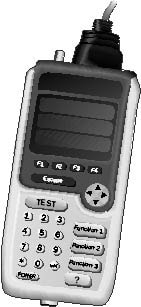Definition of Cable Tester in Network Encyclopedia.
What is Cable Tester?
A Cable Tester is a device for measuring the integrity and transmission characteristics of cabling. Cable testers perform various functions to test network cabling for compliance with cabling standards developed by bodies such as the Telecommunications Industry Association (TIA), the International Organization for Standardization (ISO), and the International Electrotechnical Commission (IEC). Cable testers are useful to local area network (LAN) administrators, cable installers, and field service providers for testing and certifying cabling installations as compliant with these standards.

How It Works – Cable Tester
Cable testers come in a variety of forms, ranging from handheld to briefcase size. They are generally divided between those used for testing fiber-optic cabling and those used for testing copper cabling. Different testers have different capabilities, but their general function is to measure various electrical characteristics across different ranges of frequencies.
Testers will typically measure some or all of the following parameters at various frequencies from 100 MHz to 350 MHz and beyond:
- Attenuation, which is the decibel decrease in signal strength as a signal propagates through a physical medium
- Impedance, which is the resistance to the flow of alternating current
- Noise, indicated by the floor values for randomly generated electrical signals
- Near-end crosstalk (NEXT), which is a decibel measurement of crosstalk taken at the end where a signal is injected
- Attenuation to crosstalk ratio (ACR), which is the decibel difference between NEXT and attenuation values
- PowerSum NEXT, which measures the crosstalk between a single pair of wires and all other pairs in the cable
- The distance to a short or unterminated cable end, used for link-testing the continuity of circuits
- Check Cable Testers prices and models in Amazon.
Cable testers for several types of cables
Look for cable testers that can perform comprehensive and programmable sets of autotests for a variety of cable types. A good cable tester can tell you at the push of a button whether installed wiring can support different kinds of networking architectures – such as coax, 10BaseT, 100BaseT, 100BaseVG, and token ring. Cable testers should be able to store measurements taken so that they can be analyzed separately afterward. The most accurate types of cable testers for unshielded twisted-pair (UTP) cabling are those that can test and certify category 5 cabling to Level II TSB-67 compliance. An all-in-one cable tester is an invaluable tool and a good investment for the network administrator. It can make up for its cost in higher network availability.
Use a fiber-optic tester and an optoelectronic light source to test both ends of a new spool of fiber-optic cabling before beginning an installation with this cable. A good fiber-optic cable test should give you not only a pass/fail analysis of an installed cabling setup, but also quantitative values of the optical link capabilities of your wiring configuration.
You can find all kind of Cable Testers in Amazon.